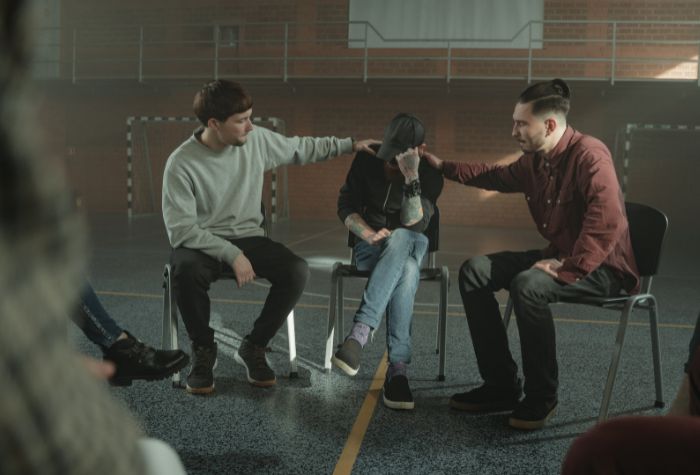Sometimes life feels like such a struggle, and that’s especially true when it comes to fighting addiction. Making the decision to recover makes you feel so powerful. Maybe that’s why a relapse makes you feel powerless. And why, afterwards, getting back on track seems impossible, or even pointless.
But you should know that, even if you’ve relapsed, you’re still doing a great job. You made the choice to fight and change your life, and every time you get back up and try again, you’re proving that you’re committed to that decision.
Relapse Is Part of the Process
Sometimes during recovery, you might experience a lapse, where you drink or use briefly, but then immediately stop again. What’s harder to bounce back from is a relapse – when you make a complete return to drinking or using drugs. A relapse isn’t your fault. Substance use actually changes your brain, even long after you’ve quit, often triggering relapse.
So relapse is part of the process. That doesn’t mean it’s an excuse to just give up and start drinking or using again. It just means that there’s a reason it happens, and it’s not because of any personal shortcomings. Instead of focusing on this slip up, focus on the days or weeks or months you were clean. And remember: progress isn’t linear.
Related: Celebrate your recovery – even if you’re still on your journey
Getting Clean After a Relapse
Starting over after a relapse can be hard, but it is worth it. And, with the right mindset and support, it can be easier than you think.
What to Do Right After a Relapse
After a relapse, your initial reaction probably wasn’t so great. Maybe you thought ‘See, I can’t do this. Why did I even try?’ or ‘Well, might as well keep using. I already messed up now.’ Sometimes, it’s hard to pull yourself out of those feelings of despair or failure, but the best way to make sure you get through this and back on track is to immediately take action.
Reach Out for Help Right Away
Reach out for help as soon as possible after a relapse. This could mean calling or texting a trusted friend or family member, your sponsor or your therapist. Crisis lines are especially helpful because they’re available 24/7 and the staff are trained to help out in times like these.
Just talking about what happened can really help a lot. Or you might need a friend to come over and be there with you. Don’t be afraid to ask for what you need!
Need to talk to someone now? Reach the National Crisis Lifeline by dialing or texting 988 or call 757-925-2484 for the WTCSB Emergency Services Line if you need immediate support, like medical detox and/or admission into a treatment program.
Get Medical Detox
If you’ve experienced a full relapse, it’s likely that you’ll need to do medical detox again. In the care of professionals, you can be certain you won’t suffer from uncomfortable, painful or even dangerous withdrawal symptoms.
Avoid Triggers
Do you know your personal triggers – the things that make you want to drink or use drugs? They could be certain thoughts or memories of past experiences that give you negative feelings. They could be people, places or even things that remind you of substance use. It’s crucial to remove triggers from your personal space or if necessary, remove yourself from those triggers, as soon as possible. If that’s not possible, do everything you can to minimize contact with triggers.
Attend a Support Group as Soon as Possible
If you already regularly attend a support group, go to the next available meeting. Most support groups have meetings pretty often, so you should be able to attend one in the next day or two. This is especially helpful if there isn’t anyone else who can meet you in person right now.
If you aren’t already a member of a support group, you might choose a well-known group like Alcoholics Anonymous or Narcotics Anonymous, a smaller local group or even online support groups, like Reddit boards or Facebook groups.
Practice Self-Care
This doesn’t necessarily mean face masks and scented candles (but it can). Self-care simply means taking care of yourself, both physically and mentally. Make sure to eat healthy food and to eat enough, get some exercise and fresh air, keep up on your hygiene, spend time with the sober-friendly people in your life and do those non-trigger activities that bring you pleasure, whether it’s yoga, playing video games, binging Netflix, playing with your dog or something else.
Avoiding a Relapse in the Future
While it’s not always easy, avoiding risk factors is the key to avoiding future relapses.
Avoid Common Relapse Risk Factors
Common risk factors for relapse include:
Your Personal Triggers
After you feel like you’re in a safer space, reflect on the relapse. What triggered your relapse? Was it being around certain people who use substances or otherwise trigger you? Were you at a party with drug use or a bar or restaurant that serves alcohol? Did memories of a traumatic experience resurface? And what can you do to avoid those triggers in the future?
It’s not always easy to avoid triggers and it’s important to remember that triggers can be positive experiences, too – like birthday parties and holidays. Sometimes, to protect yourself, you have to avoid these situations or make changes, like maybe asking for or planning a substance-free celebration.
Stress
Stress is a major risk factor for relapse. Doing everything you can to avoid your known stressors is important, but, of course, it’s impossible to completely avoid stress. It’s just a part of life. So being prepared with a list of stress-relieving activities can help you to combat stress and the urges that often come with it.
Not Setting Boundaries
Conflict with others, especially family conflict, has been shown to be a major risk factor for relapse. We can’t choose our families, but if the people in your life aren’t helping you on your recovery journey, they’re hurting you – and making it harder for you to succeed.
Are there certain boundaries you need to put in place (with yourself or others) to protect yourself? What might those boundaries look like?
Opioid Pain Medications
Always disclose to any medical professional your history with alcohol or drug use. Opioid pain medications are almost always prescribed after surgery or for an injury, so if you have to have a surgery or are injured, you need to talk to your doctor about other options.
Not Having Social Support
Those in recovery with social support have a much higher chance of completing recovery and of maintaining sobriety. Social support can be informal, like having a close friend or family member you can call any time day or night, or it can be more structured, like a support group.
Peer Support is also worthwhile. A Peer Recovery Specialist is someone who’s successfully completed recovery and is now using their experiences to help others succeed in recovery. Peer Support tends to be very effective, probably because it’s so helpful to talk to someone who’s been there before. You know they will really understand and that they won’t judge you.
Feeling Like You Don’t Have a Purpose
Some people who’ve struggled with addiction find that after they get clean, they feel like their life lacks purpose. Maybe before, you spent a lot of your free time using drugs or drinking alcohol. Sobriety might make you feel like your drive in life is now gone. You might think ‘What now?’
So what’s next? Anything you want. This is the time to make your new beginning and write your story. It’s never too late to live the life you want to live. Your purpose might be going to school or finding a new career and finally quitting that job you hate. It might be sharing your passions and talents with others by joining a group or club, creating art or even teaching someone something. Or it could simply be spending more time with the people you love.
You might even want to recover so you can help others struggling with addiction as a Peer Recovery Specialist.
Focusing on your purpose, whatever it might be, will guide you on your path to recovery.
Related: How sharing your experience can help someone else
You Don’t Have To Do This Alone
Maybe you can’t always avoid being around drugs or alcohol, but you can do your best. You might not be able to completely cut triggering people or situations out of your life, but you can do what you can to cope with them in a healthy way. Maybe you can’t get sober on your first try, but you can keep going.
And maybe you can’t do this alone, but you don’t have to. Even if you don’t have close friends or family who can help, you can always find support if you ask.
We’re your local, single-point-of-entry for behavioral health services in Suffolk, Franklin and the counties of Isle of Wight and Southampton.
If you’re ready to accept help, our team is here for you. We’re proud to provide compassionate, evidence-based care for recovery support.
You can call us at 757-758-5106 or make an appointment online for same-day access.






